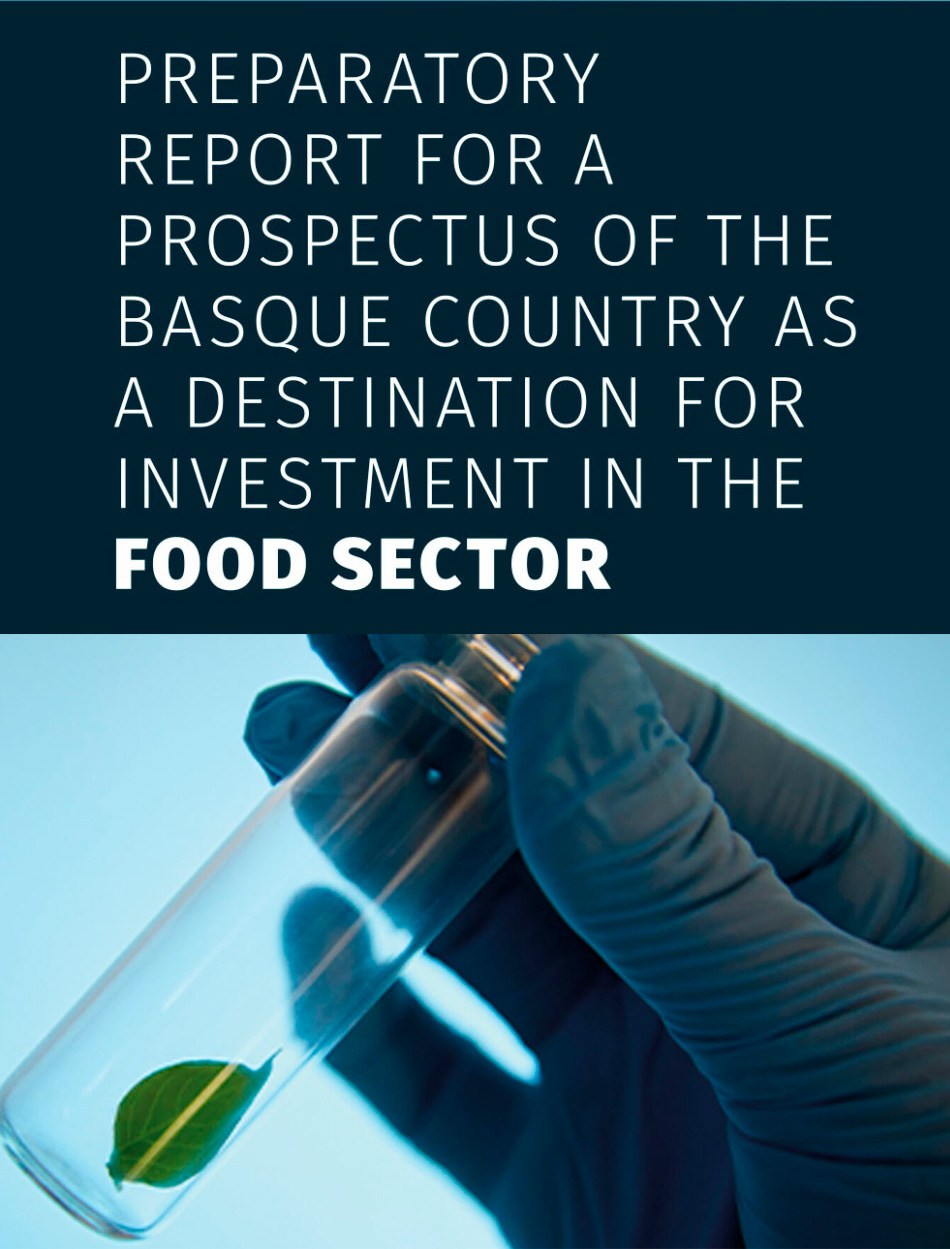
Programmes and plans promoted by the Basque Government

Get to know the ONekin! Program
In this page you will find the programmes and plans promoted by the Basque Government for all agents in the value chain of food and wood and the rural and coastal development of the Basque Country. Discover all policies and regulatory frameworks involved in these sectors so that you can take them into account when creating or developing your project. From here, you can access the original documents with complete information.
Basque Country Energy Strategy 2030
Energy efficiency and renewable energies have become key tools to mitigate the environmental impact of activities carried out in the Basque Country, reducing the energy consumption bill for citizens, boosting company competitiveness, and moving toward a sustainable society.
BASQUE FORESTRY PLAN 1994-2030
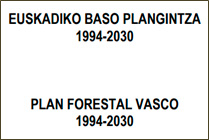
The Basque Forestry Plan implements the Basque Rural Strategic Plan for a part of the region to which society is increasingly receptive: forests, fauna, flora and Natural Parks. Its objectives include increased cohesiveness for the forestry sector, pushing it to its greatest potential and facilitating business action.
This Plan is the framework for the Strategic Wood Industry Plan for the Basque Country 2012-2014. After its completion, a new process of strategic reflection was begun, revolving around five lines of action. Within this scope, the technological and training solutions the sector requires and supporting actions for companies are of note.
Biodiversity Strategy for the Autonomous Community of the Basque Country 2030
The Biodiversity Strategy for the Autonomous Community of the Basque Country 2030 is the instrument that sets forth priorities and commitments in terms of our natural heritage, with sights set on the year 2030.
This is an initiative that is applicable regionally, but with a global vision, aligned with the Strategic Plan for Biological Diversity 2011-2020, stemming from the UN Convention on Biological Diversity, the EU Biodiversity strategy for 2020, and the National Strategic Plan for Natural Heritage and Biodiversity 2011-2017. These documents also establish a series of goals and actions to undertake the pressures and threats faced by biological diversity internationally.
BUSINESS INTERNATIONALISATION PLAN
Business Internationalisation Plan 2017-2020
This provides the Basque Government’s commitment to supporting the internationalisation of companies as one of the fundamental contributes for economic and social transformation. Along with innovation, investment, and industrialisation, internationalisation is part of the 4 I’s upon which the Framework Programme for Employment and Economic Recovery 2020 in the Basque Country is based and is one of the Ministry of Economic Development and Infrastructures’ priority actions this term.
UPDATE BEING PROCESSED
COMPREHENSIVE SERVICE PLAN FOR TEMPORARY WORK
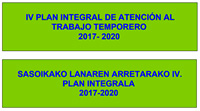
The 4th Comprehensive Service Plan for Temporary Work 2017-2020’s general objective is to coherently plan, and in a coordinated fashion, the actions that meet needs revolving around temporary work.
This 4th Plan’s structure follows the basic outline used in previous plans, based on the Ararteko’s report “Situation of the temporary population in Alava,” and falls under three large blocks: improving hiring conditions, lodging, and service for minors related to the temporary population.
Euskera Strategic Agenda 2017-2020
Based on the Euskera Strategic Agenda, there are four commitments presented by the Ministry of Culture and Language Policy of the Basque Government:
– The first commitment is to continue increasing the number of Basque-speakers, continuing the trend in recent decades.
– Secondly, to continue promoting the use of Basque, especially in leisure and informal settings. Thirdly, to reaffirm the commitment to continue to effectively guarantee linguistic rights for citizens.
– Lastly, to reinforce collaboration between public institutions in the three Basque-speaking regions, all while working to continue to promote international recognition of the Basque language.
UPDATE BEING PROCESSED
Equality Plan for Men and Women in the Autonomous Community of the Basque Country
Proposals in the “7th Plan for Equality between Women and Men in the Autonomous Community of the Basque Country” sets forth the work itinerary to make progress in reaching equality between women and men. In its application, it involves all public Basque powers and administrations which, pursuant to the lines of action set forth by the Plan, must draw up their own plans and programmes for equality action.
FEMP OPERATIVE PROGRAMME 2014-2020
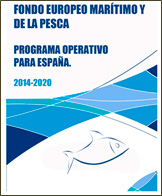
The FEMP Operative Programme 20 14-2020 by the Spanish State defines a strategy to implement the FEMP’s measures.
The FEMP is the EU’s new fund for maritime and fishing policies proposed for the 2014-2020 period, in replacement of the previous European Fisheries Fund. The inspiring principles for this new Fund are:
- Aiding fishermen in transitioning toward sustainable fishing.
- helping coastal communities to diversify their economies.
- Funding projects to create employment and improve quality of life on European coasts and providing access to funding.
- The FEMP also sets the objectives established by the Europe 2020 Strategy as a backbone, which includes smart, sustainable and integrative growth, as well as harmonious development of the Union.
FOOD INDUSTRY COMPETITIVENESS PLAN (PLAN DE COMPETITIVIDAD DE LA INDUSTRIA ALIMENTARIA) (PEICA)
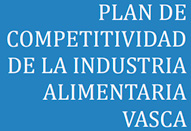
The PEICA’s objective is to drive development of a strong, competitive and sustainable food industry related to local, quality products. This is fruit of reflection with all agents on the chain of value (productive, transforming, distributor and consumer sector), and the Plan is structured around 5 strategies and 8 specific objectives. Strategy 3 is of note: Innovation and technological transfer (support for innovation initiatives, driving technological transfer). Strategy 4 is also of note: Financial support (establishing financial aid lines for the food industry).
Health Policies for the Basque Country 2013 – 2020
Considering people as the central theme of all policies, the Basque Health Plan 2013-2020 seeks to improve maintenance and improvement of Basque citizens’ health. To this end, it is essential that we guarantee fairness and sustainability in the healthcare system, but also that we make health an asset in other public policies.
Within health policies, actions are set forth that are designed to reduce food waste.
UPDATE BEING PROCESSED
Inter-Institutional Entrepreneurship Plan of the Basque Country-PIE 2021-2024
The main objective of the PIE 2024 is to drive entrepreneurship in all its aspects to give birth to and grow projects, companies, and jobs that are competitive and sustainable, as a driving force for a new phase in economic recovery, inclusive growth, and sustainable development in the Basque Country.
PCTI EUSKADI 2030
Basque Country Science, Technology, and Innovation Plan 2030 (PCTI).
The PCTI 2030 is the Basque Country’s strategic plan for Research and Innovation. A long-term plan to drive science, technology, and innovation, as springboards to accelerate the transition toward a digital, green, and inclusive Basque Country.
The Plan is aligned with Europe, and more specifically with the Horizon Europe Framework Programme, the Digital Europe Programme, the European Green Deal, and the Next Generation EU Programme.
Moreover, the PCTI Euskadi 2030 is tackling a triple transition: technological-digital, energetic-ecological, and social-health.
It is based on four pillars:
– Scientific excellence
– Technological industrial leadership
– Open innovation
– Talent as the central hub
The Plan is facing three great challenges:
– Increasing investment in Research and Development, especially in the business sector
– Driving innovation at small and medium-sized enterprises
– Boosting the presence of women researchers
PLAN TO FOMENT ECOLOGICAL PRODUCTION IN THE BASQUE COUNTRY (PLAN DE FOMENTO DE LA PRODUCCIÓN ECOLÓGICA DE EUSKADI (FOPE)
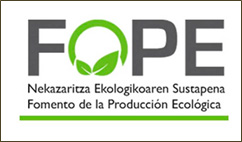
The Plan to Foment Ecological Production in the Basque Country’s objectives are to increase ecological production, develop the transformation and commercialisation chain and reinforce demand for local ecological products. Thus, amongst other priorities, the FOPE promotes the development of and the market for local ecological products and addresses the positioning of companies on the foreign market.
RIS 3
RIS3 Euskadi is a strategy for regional economic transformation that concentrates available resources in a limited set of R+D and innovation priorities.
It seeks to delve deeper into areas of great added value that create growth and employment, meaning areas of opportunity where the Basque Country holds business and scientific-technological capability.
Specifically, there are three strategic areas:
– Advanced manufacturing
– Energy
– Bioscience/health
and four regions for opportunity:
– Food
– Urban Habitat
– Ecosystems
– Cultural and creative industries
PAC (Shared Agricultural Policy) Strategic Plan (PEPAC) 2023-2027
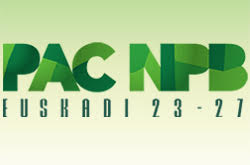
The Strategic Plan of the PAC (Shared Agricultural Policy) Euskadi 23-27 seeks to respond to the economic, social and environmental needs of the agri-food and wood value chains, and the rural environment, through the interventions of the first and second pillar. It aims at the sustainable development of agriculture, food and rural areas to ensure food security for society through a competitive sector and a living rural environment. This strategic approach aims to contribute to the consolidation of the economic value of the agrifood system, in a sustainable manner over time. On the basis that the agri-food system and rural development are strategic for the Basque Country, the Plan aims to lay the foundations for it to continue to be so over the next decade. The financial contribution to carry out this Plan comes from the FEAGA and FEADER European Funds and from the contributions of the Basque Institutions (Basque Government and Provincial Councils). (Mantener LINK actual a osoa)
Strategic Climate Change Plan
The Basque Climate Change Plan is a planning instrument to guide the Basque Country’s actions with sights set on 2050, with intermediate objectives in 2020 and 2030, both to mitigate and to adapt to climate change.
Strategic Employment Plan 2017-2020
The Employment Plans are the strategic programme for active employment policies implemented by the Ministry of Employment and Social Affairs of the Basque Government, aimed to promote labour integration, increase employability levels, and boost the stability and quality of employment.
UPDATE BEING PROCESSED
STRATEGIC PLAN FOR GASTRONOMY AND FOOD IN THE BASQUE COUNTRY – PEGA BERRIA

The Strategic Plan for Gastronomy and Food 2024, PEGA Berria, gives continuity and strengthens the previous PEGA that began its journey in 2017 as one of the strategic commitments of the Basque Government.
The Food and Gastronomy Value Chain plays a strategic role in the Basque economy, with a tractor effect due to its weight in the GDP and in the employment generated, and its ever-increasing contribution in the trade balance and investment in innovation, the important multiplier effect it generates on the global economic activity and its backbone component of the territory.
The objective of the PEGA Berria is to continue promoting and developing gastronomy and food as a strategic sector for the economy of the Basque Country due to its capacity to generate employment and economic activity, preserve the gastronomic cultural heritage and the natural and landscape resources. Through this plan, policies and tools for the promotion of gastronomy and the food industry are fostered, especially those that promote a quality and healthy local product, that promote sustainability, the creation of a quality tourism proposal and the international dissemination of the Basque Country brand.
STRATEGIC FRAMEWORK TO SUPPORT ENTREPRENEURSHIP
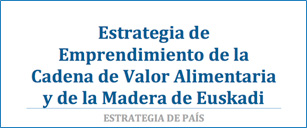
The Strategic Framework to Support Entrepreneurship in the Food and Wood Chain of Value of the Basque Country is a commitment to support entrepreneurship of main agents, as a shared effort for economic and social transformation on the food and wood chain of value of the Basque Country.
It includes the programmes and instruments to support all collectives, types and stages of the entrepreneurial process, to drive an increasing entrepreneurial society, activate the entrepreneurial potential of the food and wood chain, develop new projects and competitive and sustainable companies that create economic activity and quality employment, and position the Basque Country as an attractive location for entrepreneurial activity.
STRATEGIC FRAMEWORK FOR THE DEVELOPMENT OF SMART DIGITISATION ON THE BASQUE COUNTRY’S CHAIN OF GASTRONOMY AND FOOD VALUE
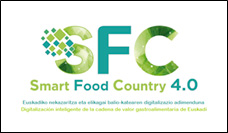
The Strategy for Smart Digitisation on the Basque Country’s Chain of Gastronomy and Food Value aims to contribute value to the gastro-food chain in the Basque Country through smart digitisation. It has the following strategic objectives:
- To promote actions to facilitate the transfer of digital knowledge to the agro-food sector and support definition of technological innovation strategies.
- to drive work formulas that accelerate the incorporation of technologies into the gastro-food chain by means of different collaboration models between companies and support for entrepreneurship, through technological start-ups.
The Smart Digitisation Strategy rests on three lines:
- Establishment of the Basque framework for digitisation on the chain of value related to gastronomy and food.
- Training and connection with the food ecosystem. Access to knowledge.
- Roll-out of the digitisation strategy.
STRATEGIC PLAN FOR THE IDIAZABAL DESIGNATION OF ORIGIN
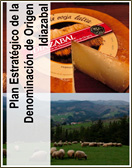
The main objective of the Idiazabal D. O. Strategic Plan is to recover the production network linked to the Idiazabal sector. To achieve this objective, the Plan defines the following general objectives:
- Generating sustainable employment related to the territory.
- Increasing the number of assets.
- Increasing profitability of operations and cheese manufacturing sites.
- Increasing the volume of Idiazabal cheese.
- Increasing consumption per capita in the Basque Autonomous Community and in Navarre.
- Increasing the volume sold outside the Basque Autonomous Community and Navarre..

